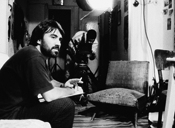 The opening question for filmmaker Zeki Demirkubuz was an offshoot of a topic that had been mentined at an earlier Q&A during one of the screenings for his film, specifically, his thoughts on the fact that Turkey is one of the few countries in the world where the film audience is actually growing. Demirkubuz responded that while mainstream Turkish films had retained a certain level of commercial quality, filmmakers such as Yilmaz Güney had always infused their own personalities into their films. Demirkubuz, however, suggests that the movement towards personal filmmaking in Turkey during the 1990s – of which his films are also a product – were the unexpected byproduct of the dynamics of the September 12, 1980 military coup in Turkey. In essence, the coup shifted the cultural (and consequently, creative) focus from political engagement to personal filmmaking.
The opening question for filmmaker Zeki Demirkubuz was an offshoot of a topic that had been mentined at an earlier Q&A during one of the screenings for his film, specifically, his thoughts on the fact that Turkey is one of the few countries in the world where the film audience is actually growing. Demirkubuz responded that while mainstream Turkish films had retained a certain level of commercial quality, filmmakers such as Yilmaz Güney had always infused their own personalities into their films. Demirkubuz, however, suggests that the movement towards personal filmmaking in Turkey during the 1990s – of which his films are also a product – were the unexpected byproduct of the dynamics of the September 12, 1980 military coup in Turkey. In essence, the coup shifted the cultural (and consequently, creative) focus from political engagement to personal filmmaking.
On the question of the role of the government in Turkish cinema today, and in particular, the working policy of the ruling party, AKP towards national and independent production films, Demirkubuz indicated that he has not personally encountered any problems with censorship, and that, for the most part, censorship resides more in the realm of public reaction, which affects the commerciality of the film. Ironically, the relationship between the AKP and artists has actually improved with respect to censorship because it has enabled the artistic community access to a broader spectrum of cultural material (in his case, classical and world literature) than was available in Turkey before 1980.
Continuing on the idea of the popularity of cinema in Turkey, noting that the country has a 72% film viewership, Demirkubuz also answers the somewhat rhetorical question of “Is there really a film industry in Turkey?” by remarking that the infrastructure and technical support for all stages of filmmaking and post-production currently exist domestically.
Asked to comment on the spirituality or “religious essence” of his films, particularly in Waiting Room, Demirkubuz prefaces his response by saying that the relationship between the viewer and the screen cannot be explained in metaphysical terms. So, in a sense, the ideology of a film is also something inconcrete and irrational. Rather, cinema is about the projection of the human condition, the “feeling of life”. This abstract quality, therefore, suggests a closer affinity to spirituality rather than religion. However, it should also be noted that theology and art also share this kinship in that both pursuits are, in a way, a search for meaning.
Demirkubuz was also asked to address how his filmmaking has changed since his sophomore film, Innocence, which screened in Venice, elevated him to the status of an international filmmaker, to which he responded that he was not motivated by international considerations, but rather, his own integrity, his “ethics”. Adding that he has a fundamental belief in the conscience of his audience – that people will instinctually respond if an artist creates something from his core – he subsequently argues that this universality is similar to the continued relevance of novelists such as Fyodor Dostoevsky, Honoré de Balzac, Albert Camus, and T.S. Eliot in the ability of their works to transcend geography.
A point was raised that while the trauma of the 1980 coup had energized a “New Cinema” movement in Turkey, the same cultural renaissance cannot be said for other art forms. Demirkubuz’s comment on this polarity was based solely on his own experience, specifically, that before 1980, the only Russian author popularly known in Turkey was Maxim Gorky, but after 1980, people discovered the works of Turgenev and Dostoevsky. Demirkubuz parallels this cultural enlightenment to the renaissance of Iranian films following the country’s Islamic Revolution – an ironic consequence of profound shifts in prevailing cultural attitudes and ideologies that comes with the trauma of revolution.
Lastly, Demirkubuz remarked that in his filmmaking process, he pays particular attention to the faces of the actors, adding that as his cinema has evolved, he has continued to distill his images further and further, to the point of their reflected interiority. He summarizes this aesthetic ideology by paraphrasing Friedrich Nietzsche’s theory that the more a person understands the world around him, the more isolated he becomes from his surroundings.
Acquarello, 2007 [reprinted]